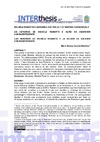Identificador persistente para citar o vincular este elemento:
https://accedacris.ulpgc.es/jspui/handle/10553/58693
| Campo DC | Valor | idioma |
|---|---|---|
| dc.contributor.author | García-Sánchez, Maria Soraya | en_US |
| dc.date.accessioned | 2019-12-16T19:08:54Z | - |
| dc.date.available | 2019-12-16T19:08:54Z | - |
| dc.date.issued | 2011 | en_US |
| dc.identifier.issn | 1807-1384 | en_US |
| dc.identifier.other | Dialnet | |
| dc.identifier.uri | https://accedacris.ulpgc.es/handle/10553/58693 | - |
| dc.description.abstract | Este artículo se dedica a describir la evolución de la obra ficticia de la escritora contemporánea y anglo-francesa Michèle Roberts, mediante la comparación de sus novelas y uno de sus libros más recientes: The Mistressclass (2003). A pesar de presentar algunos cambios en su estilo narrativo, esta autora feminista ha mantenido la presencia de las mujeres como activistas en su ficción. Me he centrado en cómo Roberts es inspirada en características de mujeres reales, canonizadas o históricas, con el fin de crear la historia de las protagonistas que expresan su propia voz por medio de la novela moderna de la conciencia. La mayoría de las heroínas de Roberts son personajes desconocidos y marginales que se colocan en el centro de sus narraciones con el propósito de volver a escribir sus propias historias. La historia personal se torna vital para tener acceso a la historia general de las mujeres. | en_US |
| dc.description.abstract | This article is devoted to describe the fictional evolution of the contemporary Anglo-French writer Michèle Roberts by comparing her novels to one of her more recent books: The Mistressclass (2003). Despite presenting some changes in her narrative style, this feminist author has maintained the presence of women as activists in her fiction. I have focused on how Roberts is inspired by real, canonised or historical female characters in order to create story bound protagonists that express their own conscious voices by means of the modern novel of consciousness. Most of Roberts’s heroines are usually unknown and marginal characters that are positioned at the centre of her narratives in order to rewrite their own stories. The personal story becomes necessarily vital to have access to the general history of women. | en_US |
| dc.description.abstract | Este artigo é dedicado a descrever a evolução da ficção contemporânea da escritora anglo-francesa Michèle Roberts, comparando seus romances a um de seus livros mais recentes: O Mistressclass (2003). Apesar de apresentar algumas mudanças em seu estilo de narrativa, a autora feminista tem mantido a presença de mulheres como ativistas em sua ficção. Tenho focado em como Roberts é inspirada por personagens femininas reais, canonizadas ou históricas, a fim de criar protagonistas ligadas à história que expressam suas próprias vozes conscientes por meio do romance moderno da consciência. A maioria das heroínas de Roberts é geralmente desconhecida e são personagens marginais que estão posicionadas no centro de suas narrativas, a fim de reescrever suas próprias histórias. A história pessoal torna-se necessariamente vital para ter acesso à história geral das mulheres. | en_US |
| dc.language | por | en_US |
| dc.relation.ispartof | INTERthesis: Revista Internacional Interdisciplinar | en_US |
| dc.source | INTERthesis: Revista Internacional Interdisciplinar [ISSN 1807-1384],v. 8 (2), p. 199-214 | en_US |
| dc.subject | 620203 Estilo y estética literarios | en_US |
| dc.subject.other | Heroines | en_US |
| dc.subject.other | Michèle Roberts | en_US |
| dc.subject.other | Novel | en_US |
| dc.subject.other | Women‟s writing | en_US |
| dc.subject.other | Heroínas | en_US |
| dc.subject.other | Novela | en_US |
| dc.subject.other | Romance | en_US |
| dc.subject.other | Escrita das mulheres | en_US |
| dc.subject.other | Escritura de mujeres | en_US |
| dc.title | As heroínas de Michele Roberts e a ação de escrever conscientemente | en_US |
| dc.title.alternative | Las heroínas de Michèle Roberts y la acción de escribir conscientemente | en_US |
| dc.title.alternative | Michèle Roberts’s heroines and the act of writing consciously | en_US |
| dc.type | info:eu-repo/semantics/article | en_US |
| dc.type | Article | en_US |
| dc.identifier.url | http://dialnet.unirioja.es/servlet/articulo?codigo=5175746 | - |
| dc.description.lastpage | 214 | - |
| dc.identifier.issue | 2 | - |
| dc.description.firstpage | 199 | - |
| dc.relation.volume | 8 | - |
| dc.investigacion | Artes y Humanidades | en_US |
| dc.type2 | Artículo | en_US |
| dc.contributor.authordialnetid | 3750738 | - |
| dc.identifier.dialnet | 5175746ARTREV | - |
| dc.identifier.ulpgc | Sí | es |
| item.grantfulltext | open | - |
| item.fulltext | Con texto completo | - |
| crisitem.author.dept | GIR Discourse, Communication and Society | - |
| crisitem.author.dept | Departamento de Filología Moderna, Traducción e Interpretación | - |
| crisitem.author.orcid | 0000-0003-1095-9410 | - |
| crisitem.author.parentorg | Departamento de Filología Moderna, Traducción e Interpretación | - |
| crisitem.author.fullName | García Sánchez, María Soraya | - |
| Colección: | Artículos | |
Visitas
63
actualizado el 05-oct-2024
Descargas
43
actualizado el 05-oct-2024
Google ScholarTM
Verifica
Comparte
Exporta metadatos
Los elementos en ULPGC accedaCRIS están protegidos por derechos de autor con todos los derechos reservados, a menos que se indique lo contrario.
